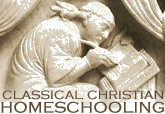Latin Resources
For 1st - 12th grades.
Necessary helps and study aids for teaching Latin in the homeschool.
Greek Resources
For 1st - 12th grades.
Necessary helps and study aids for teaching New Testament or Attic (classical) Greek in
the homeschool.
Hebrew Resources
For 1st - 12th grades.
Necessary helps and study aids for teaching Hebrew in the homeschool.
 This section of
the catalog is under construction. Thank you for your patience during this process. This section of
the catalog is under construction. Thank you for your patience during this process.
 Vox Latina Vox Latina
W. Sidney Allen
Subtitled: The Pronunciation of Classical Latin. There are two
pronunications of Latin most commonly used in instructional texts: classical Latin, that
pronunciation thought to be in use during the age of the great Roman writers (Vergil,
etc.), and ecclesiastical Latin, that pronunciation which developed over centuries of use
into the Middle Ages in church services and worship. This guidebook tackles classical
Latin, since the pronunciation for ecclesiastical Latin is more easily found. As far as
which pronunciation to use in homeschool, that really doesn’t matter. Most people
learn Latin today to read and write it, not speak it conversationally.
The standard Latin dictionary is Lewis and Short or Oxford, both of
which are expensive and vastly detailed, not making them easy to use for the beginner. Lewis and Short can
be found online by following the link; the excellent dictionaries offered below are a
little more manageable for students and teachers (as opposed to classical scholars) and
are helpful when it is inconvenient to turn on the computer to check up on vocabulary or
help with translation.
 Bantam New
College Latin and English Dictionary Bantam New
College Latin and English Dictionary
John Traupman
For all ages. Traupman’s Latin-English Dictionary has been
totally revised and expanded. This invaluable reference, based on the foremost classical
authorities and organized to achieve the utmost clarity, precision, and convenience, now
features more than 70,000 new entries that correspond to current English usage, in
addition to a larger range of illustrative phrases. Helpful features includes a
comprehensive format, a classical and ecclesiastical pronunciation guide, and more. A mass
market paperback.
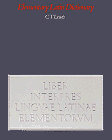 Elementary
Latin Dictionary Elementary
Latin Dictionary
Charleton Lewis
For all ages. I couldn’t say it better than this
enthusiastic yet accurate reviewer: “This is a superb dictionary for the serious
student of Latin literature, both intermediate and advanced. There are references to the
major works which a student is likely to read, often solving dilemmas in the examples. Yet
the size of the entries is manageable in length. If the word is not there, you need Lewis
and Short or the Oxford, neither of which is of a size designed to be useful for normal
translating and give far more information than one normally needs. It also has an
advantage over the paperback versions. It will lie open on a table or desk. As a Latin
teacher and sometimes graduate student in Latin, I consider this the most useful
dictionary available.” For those with a little more to spend, who prefer a hardbound
dictionary.
 A Latin
Grammar A Latin
Grammar
James Morwood
For 7th grade and up. Besides a Latin dictionary, a Latin grammar
is the next must-have reference tool for serious learners of Latin. A Latin Grammar
is an exercise in clarity, simplicity, and utility for beginning and intermediate students
of Latin. Each grammatical point begins with an explanation of the comparitive grammar in
English, if such exists. Grammatical points are illustrated with short, easy sentences in
Latin, with the grammar in question highlighted in bold type, with an accompanying English
translation. Each chapter includes practice sentences in both Latin (some of which are
from classical authors) and English. The book includes a limited vocabulary section, a
verb system reference, and a glossary of grammatical terms. The standard Latin Grammar, Allen &
Greenough’s, is currently in print only in a poor paperback
edition, but is available online by following the link.
 Gildersleeve’s
Latin Grammar Gildersleeve’s
Latin Grammar
Basil L. Gildersleeve and G. Lodge
For 10th grade and up. A classic Latin grammar favored by many
students and teachers, Gildersleeve’s Latin Grammar is now back in print, and is an
excellent grammar for use with advanced students of Latin. Gildersleeve wrote, “No
study of literature can yield its highest result without the close study of language, and
consequently the close study of grammar.” The standard Latin Grammar, Allen &
Greenough’s, is currently in print only in a poor paperback
edition, but is available online by following the link.
 English Grammar
for Students of Latin English Grammar
for Students of Latin
Norma Goldman
For 7th grade and up. This is just the ticket when you find
yourself working your way through your Latin lessons, and come across the cryptic
explanation, “Note that Latin has only these present active indicative forms, and so
simple or progressive or emphatic translations are possible, depending on context.”
Huh??? The terms used from English grammar are given to help you understand the Latin
lesson; however, if one’s English grammar is a little rusty, one won’t benefit
much from the help. English Grammar for Students of Latin comes to the rescue,
saving the day and your sanity. As an added bonus, the explanations of both English and
Latin grammatical concepts are very clear.
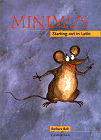 Minimus:
Starting Out in Latin
Minimus:
Starting Out in Latin
Barbara Bell
For 1st-6th grade. Minimus the Mouse is your guide to beginning
Latin concepts and vocabulary via the fun stories he tells. He also manages to impart
quite a bit of information on Roman culture and society ever so unobtrusively. Lots of fun
for kids and teachers alike.
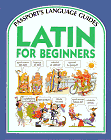 Latin For
Beginners Latin For
Beginners
Angela Wilkes
For 1st-6th grade, or any beginning Latin student. In a first
words picture book format, Latin for Beginners helps students learn conversational
phrases in Latin (“Salve!” “Valete!”) as well as expanding their
vocabulary by introducing words grouped around similar themes (fruit, colors, names for
body parts, etc.) Children, attracted to the bright pictures and format, will increase
their Latin vocabulary just by having it lying around the house.
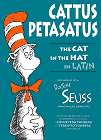 Cattus
Petasatus: The Cat in the Hat in Latin Cattus
Petasatus: The Cat in the Hat in Latin
Dr. Seuss, Jennifer and Ternece Tunberg, translators
For 1st-6th grade, or any lover of Latin. The Latin translation
still rhymes, and although the rhythm isn’t the same as the English Cat in the Hat,
the rhythm is something that was popular and in use when classical Latin was popular and
in use as a language. Books like this make Latin lessons a little more fun for everyone!
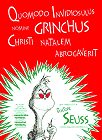 Quomodo
Invidiosulus Nomine Grinchus/How the Grinch Stole Christmas Quomodo
Invidiosulus Nomine Grinchus/How the Grinch Stole Christmas
Dr. Seuss, Jennifer and Ternece Tunberg, translators
For 1st-6th grade, or any lover of Latin. The illustrious Doctor
is back in Latin! And in this Latin translation, even the flow and cadence of the original
Grinch in English is preserved. The Tunbergs have done a superb job again, let’s hope
they keep at it. Books like this make Latin lessons a little more fun for everyone!
 Winnie Ille Pu:
A Latin Version of A. A. Milne’s Winnie-the-Pooh Winnie Ille Pu:
A Latin Version of A. A. Milne’s Winnie-the-Pooh
A. A. Milne, Alexander Lenard, translator
For all ages. Although children probably won’t be able to
read straight through this book as they would their favorite English version, for awhile,
anyway, it’s great fun looking up passages and stories to see just how many words
they are becoming familiar with; how many sentence constructions they’re able to
identify based on word inflections, and so on. We have had a great time as a family
learning to use the Latin dictionary by trying to figure out sentences from Winnie Ille Pu
with some unknown vocabulary words; older grammar stage and dialectic stage children
especially love these vocabulary “puzzles” to break up the monotony of their
Latin text every once in a while.
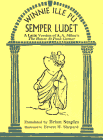 Winnie Ille Pu
Semper Ludet/The House at Pooh Corner
Winnie Ille Pu
Semper Ludet/The House at Pooh Corner
A. A. Milne, Brian Staples, translator
For all ages. The enchanting tales of Pooh and his friends were
first brought to readers in classic Latin form in 1960 with the publication of Winnie Ille
Pu. It remains the only book in Latin ever to grace The New York Times Bestseller List.
Now Winnie Ille Pu Semper Ludet is available as a companion volume. Perfect for the novice
as well as the Latin scholar, Brian Staples’ translation proves once again that Latin
is not a dead language. And Pooh, as everyone knows, will live forever.
- New Testament Greek -
 A Reader’s
Greek-English Lexicon of the New Testament A Reader’s
Greek-English Lexicon of the New Testament
Sakae Kubo
For beginning students of New Testament Greek and up. A good
lexicon is a must-have reference tool for any student of any foreign language. This
lexicon is built on an interesting and helpful premise. In most New Testament Greek
courses, the student learns the vocabulary that appears most often in the New Testament.
But when that student begins reading the New Testament in Greek, invariably he will run
into vocabulary that has not been learned because it is one of the less-used words.
However, not knowing that word will stop the student from proceeding through the New
Testament with understanding. A Reader’s Greek-English Lexicon is a
verse-by-verse lexicon, with definitions, of all the words in the Greek New Testament
which are used 50 times or less, or in other words, just what the beginning student needs:
a lexicon of the unfamiliar vocabulary. The lexical form and meaning for those words are
from the standard Greek-English lexicon by Arndt, Bauer, and Danker offered below. Other
helps include a list of unfamiliar vocabulary at the beginning of each New Testament book
of words that appear 5 times or more in that book; and appendices which give summaries of
the major points in Greek grammar.
 New Analytical
Greek Lexicon New Analytical
Greek Lexicon
George Wigram, Wesley J. Perschbacher, editor
For beginning students of New Testament Greek and up. This
excellent lexicon lists every word in the Greek New Testament, the modern Greek New
Testament based on the Alexandrian text as well as the Textus Receptus, which many modern
lexicons omit. Additionally, every single word is parsed, something that not all lexicons
do to save space, but it is a great help for students. The lexicon uses the Strong’s
numbering system, another benefit for those who prefer to translate the Textus Receptus.
An excellent analytical lexicon, with brief but accurate definitions.
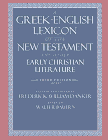 Greek-English
Lexicon of the New Testament and Other Early Christian Literature
Greek-English
Lexicon of the New Testament and Other Early Christian Literature
William Arndt, Walter Bauer, and Frederick W. Danker, editor
For intermediate and advanced students and up. This is THE
standard lexicon for New Testament Greek. Thorough, complete, and expensive, it has also
been revised with beginning students in mind. The Greek-English Lexicon is the new updated
American edition of Walter Bauer’s Wörterbuch zu den Schriften des Neuen
Testaments, and builds on its predecessor’s staggering deposit of extraordinary
erudition relating to Greek literature from all periods. Including entries for many more
words, the new edition also lists more than 25,000 additional references to classical,
intertestamental, Early Christian, and modern literature. Furthermore, in this revised
edition, Frederick W. Danker’s broad knowledge of Greco-Roman literature, as well as
papyri and epigraphs, provides a more panoramic view of the world of Jesus and the New
Testament. But perhaps the single most important lexical innovation of Danker’s
edition is its inclusion of extended definitions for Greek terms. For instance, a key
meaning of “episkopos” was defined in the second American edition as overseer;
Danker defines it as “one who has the responsibility of safeguarding or seeing to it
that something is done in the correct way, guardian.” Such extended
definitions give a fuller sense of the word in question, which will help avoid both
anachronisms and confusion. Knowledge of Greek is required to use this work.
Greek Grammar of
the New Testament and Other Early Christian Literature
F. Blass and A. Debrunner; Robert Walter Funk, editor and translator
For intermediate or advanced students and up. This grammar is the
standard Greek grammar of the New Testament even after four decades. Well-written,
extensive, and a goldmine of information for students of the Greek language, it is
nevertheless difficult for beginners to use. First, knowledge of koine Greek is required
to use this work. Secondly, it assumes the student of Greek is familiar with classical
(Attic or Homeric) Greek, and although at one time in the past it was inconceivable that a
well-educated person would not be familiar with both classical Greek and Latin, such is
not the case today. However, this is an invaluable reference for the serious student of
Greek. Beginning students might find Ancient Greek: A Complete
Course a useful grammar reference with clear explanations.
 Complete
Vocabulary Guide to the Greek New Testament Complete
Vocabulary Guide to the Greek New Testament
Warren C. Trenchard
For beginning students of New Testament Greek and up. This guide
lists every word found in the Greek New Testament--the modern Greek text, based on the
Alexandrian text, and not on the Textus Receptus--and lists these words both by frequency
of use and cognate groups. The frequency list helps students memorize words in a logical
order, and the cognate list helps students understand the common roots of difficult
vocabulary, to help make memorization easier and retention greater. The section on
Principal Parts of Verbs, showing all the verbs used in the New Testament, includes column
headings on each page for greater ease of use. The index includes the
Goodrick/Kohlenberger numbering system.
 The Morphology
of Biblical Greek The Morphology
of Biblical Greek
William D. Mounce
For beginning students of New Testament Greek and up. The
Morphology of Biblical Greek explains how Greek words are formed, and shows that Greek
word formation follows a limited set of rules. This reference contains the most complete
set of paradigms for nouns, verbs and pronouns available for New Testament Greek. The
benefit of The Morphology is that, by learning the paradigms, vocabulary memorization
becomes easier because the Greek forms follow set patterns and rules.
- Attic and Homeric Greek -
 Vox Graeca Vox Graeca
W. Sidney Allen
Subtitled: The Pronunciation of Classical Greek. Greek is a beautiful,
poetic, musical language, and learning to pronounce it well as well as read it is a
rewarding experience. In Greek, it is thought that the accented syllables, rather than
being stressed as they are in English, indicated changes in pitch, which gave Greek its
musical quality. A second resource that will help with learning classical Greek
pronunciation, is the audio cassette Pronunciation
and Reading of Ancient Greek, which has clear recordings of all the phonetic sounds of
the Greek alphabet, as well as good examples of the accented pitch changes in Greek.
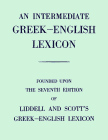 Intermediate
Greek-English Lexicon Intermediate
Greek-English Lexicon
Henry George Liddell and Robert Scott
For beginning students of Attic and Homeric Greek and up. A
standard for Homeric and Attic Greek, and also contains entries for New Testament Greek,
as well. This is the intermediate edition, not as comprehensive (or expensive) as the
complete, exhaustive, every ancient Greek word known to man edition of Scott and
Liddell’s lexicon, which is too much for beginning and intermediate students, but not
as concise as the adridged edition, which leaves out important information.
Well-organized, clear, and easy to use, this is an invaluable tool for the learner of
classical Greek.
Homeric
Dictionary
Georg Autenrieth; Robert Keep, translator
For beginning students of Homeric Greek and up. This specialized
dictionary includes every word found in Homer’s Iliad and Odyssey, and
is an invaluable tool for reading or translating Homer’s epic poems. The definitions
are comprehensive, and wonderful illustrations accompany the definitions which aid in
understanding. The dictionary also includes clear instructions on how to read Homeric
verse.
 Ancient Greek: A
Complete Course
Ancient Greek: A
Complete Course
Alan Henry and Gavin G. Betts
For beginning students of Attic and Homeric Greek and up. This
text, although it is billed as a “teach yourself” course, is difficult to use as
a self-instructing course, but the comprehensive grammar covered, clearly explained and
carefully written, contains much useful information and is helpful as a grammar reference
for beginning Greek students.
Greek Grammar
Herbert Weir Smyth; Gordon M. Messing, editor
For intermediate or advanced students and up. The standard Greek
grammar for Attic and Homeric Greek studies. It is not easy to use for beginners, but is
invaluable for anyone studying Greek for a second year or more. Comprehensive and
well-organized, this particular edition is a beautiful, durable book which will hold up
under years of use.
This online catalog is made possible through an association with Amazon.com.
Clicking on the book cover will take you to Amazon’s information page about that
book. You can look at its price, availability, any discounts currently taken for that
title, reviews of the book, and other information, as well as order it if you decide to
purchase the book. You can even place books in your shopping cart and save them for
purchase at a later time. You can continue to add or delete books from your shopping cart
until you are satisfied with your order and ready to purchase. Clicking on your
browser’s “Back” button will bring you back to this catalog.
Sometimes books go out of print, or the publisher runs out of stock. Any
book not available from Amazon.com for any reason can be searched using AddAll.com, a book shopping site which will scan Amazon
as well as Barnes and Noble, Powell’s Books, Book Close Outs and many other new and
used book sites. Be sure to also check BookFinder.com
for out of print book searches.
Still have questions? Ask
me!

|
